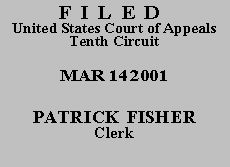

| GERRY BLAINE ULLRICH,
Petitioner-Appellant, v. TWYLA SNIDER, Respondent-Appellee. |
|
Petitioner Gerry B. Ullrich appeals the decision of the district court denying his petition for habeas corpus filed pursuant to 28 U.S.C. § 2254. Because we cannot conclude that "reasonable jurists would find the district court's assessment of the constitutional claims [here] debatable or wrong," Slack v. McDaniel, 529 U.S. 473, 484 (2000), or that the district court erred in its procedural ruling, id., we deny petitioner's application for a certificate of appealability and dismiss this appeal.
Petitioner pleaded guilty in 1997 to three counts of rape in the second degree, one count of rape in the second degree by instrumentation, two counts of indecent or lewd acts with a child under sixteen, and three counts of forcible oral sodomy. He was sentenced to thirty-four years' imprisonment. Petitioner did not appeal or move to withdraw his guilty pleas. The district court for Oklahoma County denied petitioner's application for post-conviction relief, a determination later affirmed by the Oklahoma Court of Criminal Appeals.
In his federal habeas petition, Mr. Ullrich urges four claims in support of his petition for relief. He alleges that (1) he was denied the right to counsel to file a motion to withdraw his guilty pleas; (2) he was denied his constitutional right against compulsory self-incrimination; (3) he received ineffective assistance of counsel; and (4) the state court denied him due process by dismissing his application for post-conviction relief. The case was referred to a magistrate judge who determined that the second issue (self-incrimination) was procedurally barred and that petitioner had not shown cause and prejudice or a fundamental miscarriage of justice sufficient to overcome such a bar.
The magistrate judge recommended that petitioner's claim regarding denial of the right to counsel to file a motion to withdraw his guilty pleas be denied on the merits. He further concluded that petitioner's ineffective assistance claim failed to meet the test of Strickland v. Washington, 466 U.S. 668 (1984), and that the claim regarding the state post-conviction proceedings did not present a constitutional basis for habeas relief. After de novo review, the district court adopted the recommendation of the magistrate judge and denied the petition. The district court then denied petitioner's application for a certificate of appealability (COA) and his motion to proceed on appeal without prepayment of costs or fees. Petitioner renews both requests in this court.
The statute governing the issuance of a COA "establishes procedural rules and requires a threshold inquiry into whether the circuit court may entertain an appeal." Slack, 529 U.S. at 482. No COA will be forthcoming unless "'the applicant has made a substantial showing of the denial of a constitutional right.'" Id. at 481 (quoting 28 U.S.C. § 2253(c)(2)). Because the district court rejected three of petitioner's claims on the merits, petitioner must now "demonstrate that reasonable jurists would find the district court's assessment of the constitutional claims debatable or wrong." Id. at 484. With regard to the self-incrimination issue, which the district court found to be procedurally barred, petitioner must show "that jurists of reason would find it debatable whether the petition states a valid claim of the denial of a constitutional right and that jurists of reason would find it debatable whether the district court was correct in its procedural ruling." Id.
We have reviewed the record in this case and the issues brought before us and conclude that petitioner has failed to make the required showings for a COA. We therefore grant petitioner's motion to proceed on appeal without prepayment of costs and fees and deny his application for COA. This appeal is DISMISSED.
Entered for the Court
Mary Beck Briscoe
Circuit Judge
*. This order and judgment is not binding precedent, except under the doctrines of law of the case, res judicata, and collateral estoppel. The court generally disfavors the citation of orders and judgments; nevertheless, an order and judgment may be cited under the terms and conditions of 10th Cir. R. 36.3.